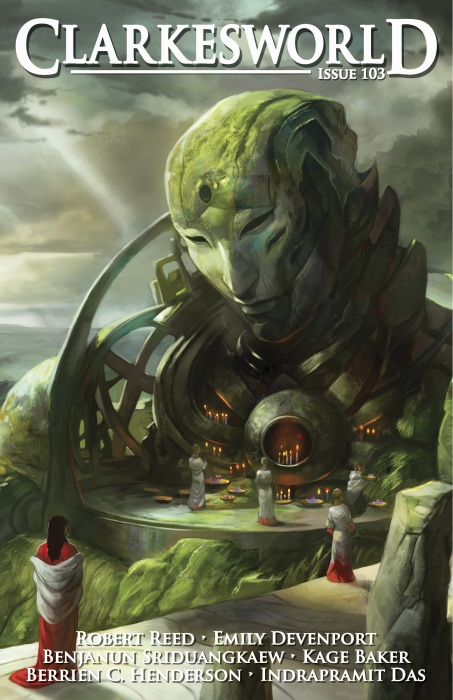Welcome back to the Short Fiction Spotlight, a space for conversation about recent and not-so-recent short stories. Last time around we revisited some Bradbury stories; this time I thought I’d check back in on a familiar haunt, Clarkesworld Magazine, and their most recent issue. With the recent change in format, here, we’ll be discussing all of the April issue’s fiction—both originals and reprints, six pieces in total.
Clarkesworld #103 features fresh short stories from Robert Reed (“The Empress in Her Glory”), Berrien C. Henderson (“Let Baser Things Devise”), Benjanun Sriduangkaew (“The Petals Abide”), and Emily Devenport (“Postcards from Monster Island”). The two reprints are “Noble Mold” by Kage Baker and “Weep for Day” by Indrapramit Das, both originally published in Asimov’s.
Robert Reed’s “The Empress in Her Glory” is a solid opening story for this issue. Adrianne Hammer is a blogger and analyst in her late middle age who, incidentally, becomes the Empress of Earth when alien forces decide to surreptitiously colonize the place. She does her best, which is reasonably well, to fix up the world and use her powers of prediction/manipulation for good ends. That basic summation doesn’t quite grasp at the core of the piece, though, which is far more about the kind of person it would take to run the Earth—and what that job might do to them, long-term—than it is the aliens or their intentions.
The prose, in particular, I appreciated; it’s got a stark and direct style that makes a great deal of sense for Adrianne’s story. She, herself, is a rather direct and stark person. I like that parallelism, and found it compelling while reading the piece. It definitely adds to the overall effect. I also liked that the hero, of sorts, is a fifty-something year old woman who is a widow and whose relationship to her child is not, perhaps, ideally motherly. She’s a person who does what she likes with an eye to the world at large, and that turns out to be just what we (might) need in a supreme ruler.
Then there’s Berrien C. Henderson’s “Let Baser Things Devise,” in which an uplifted chimpanzee considers his isolation amongst the PR stunts and not-quite-equal treatment of his corporate owners-slash-employers; his primary companion is a robot named Tsuki, who might or might not have an attachment to him of a more-than-robotic sort. A bit less compelling than the Reed, if only thanks to the fact that it doesn’t feel particularly fresh to me—it’s difficult at this point in the genre to write the “uplifted animals and their rights” story in such a way as to be striking, I suspect.
Despite that, it’s still quite readable—I wasn’t bored, though I also wasn’t particularly delighted. The best bits are the interactions between Pierre and Tsuki, which he seems somewhat oblivious to while the robot appears to be reaching out more in hopes of a positive response. Pierre, however, is pining too distinctly for the “she” chimpanzees he remembers from his youth—and whom he cannot reach or connect with now. That’s the poignant part, and it works well.
The next piece by Benjanun Sriduangkaew—“The Petals Abide”—was not quite on the level of the works I’ve appreciated from this author before (all politics and shenanigans aside). While the imagery is handsome, this time around the use of poetic diction ends up a bit overwhelming—remarkably intrusive and almost prohibitively baroque. Sriduangkaew has in the past balanced the edge of that complex and dense diction with functional narration successfully, but I don’t think that’s the case here. Which is a shame, because as per usual, there are aspects of this story that I find compelling; it’s got interesting gender and sexuality stuff, for example.
 However, that also begins to seem like a buried lede while pushing through the over-long and over-dense forest of this piece. I suspect that at a shorter length, and with some reigned in but still lush and handsome imagery, this would be a much stronger romance. And, again, I so wanted to like a piece like this with nontraditional pronoun usage—I see so damn few of them. But this wasn’t quite a stunner, and took me some effort to get through.
However, that also begins to seem like a buried lede while pushing through the over-long and over-dense forest of this piece. I suspect that at a shorter length, and with some reigned in but still lush and handsome imagery, this would be a much stronger romance. And, again, I so wanted to like a piece like this with nontraditional pronoun usage—I see so damn few of them. But this wasn’t quite a stunner, and took me some effort to get through.
Conversely—and maybe my tastes are running more to the light-hearted this afternoon?—I found Emily Devenport’s “Postcards from Monster Island” to be a fun and engaging story that had a lot of charm. It’s a riff on the ol’ kaiju thing, though in this case, it turns out that the giant monsters are actually a positive influence on the city (New York?) they centralize in. The protagonist is one of a few remaining people who didn’t evacuate; she and her associates end up convincing the government to stop uselessly attacking the creatures. And it turns out, in the end, that the creatures are protecting us.
It’s not a deep or crunchy or particularly affective story, but it’s a pleasant one, and I enjoyed reading it a lot. Our protagonist has an affable and comfortable voice; her version of events is easy to navigate and fun to follow along with. It’s hard to believe a group of folks blogging about the “real” life of the creatures on Monster Island would have sway over the president and world powers, but hey, it’s worth buying into for this piece. There’s a bit of a jarring shift from “The Petals Abide” to this story, though, so I’d perhaps suggest giving it a read after the Henderson instead.
Then there are the issue’s reprints, including “Noble Mold” by Kage Baker—a piece set in the author’s Company universe, with which I am completely unfamiliar. I think it might work better for someone familiar with the premise, and the characters, because it didn’t quite do much for me. The narrative voice is trying to be charming, and sometimes succeeds, but a lot of the story relies on its being compelling enough to follow. Overall, it’s a decent enough yarn, but I wasn’t particularly into it.
The second reprint is “Weep for Day” by Indrapramit Das, reads a bit slow but is nevertheless a decent piece. Written as the journal of a young woman on a world where half the planet is in eternal night and half eternal day, and the young woman’s people are at war with the race that lives in the darkness, it is mostly an exploration of what it means to colonize. The Nightmares were, of course, not nightmares at all but just another people—who had perhaps been around long before the narrator’s people. It’s an obvious set of reflections, but despite that, there’s something intriguing enough about the world itself; the technology required to venture into the cold dark reaches of Night, the hinted-at social mores and codes that make up the protagonist’s culture, et cetera.
It’s worth a read, though I suspect it won’t stick with me for long. Good story with an interesting world, though perhaps not as compelling as I might prefer in terms of its actual narrative—that doesn’t do as much as I’d have liked to see, and takes a while in the process. Das’s prose is solid and functional, though, and supports the good bits quite well.
Overall, a strong enough issue—while I didn’t love it all, several of the stories are enjoyable reads, and the general quality reflects what I expect from Clarkesworld: well-structured, well-written pieces that explore issues of culture and society as much as the science-y bits.
Lee Mandelo is a writer, critic, and editor whose primary fields of interest are speculative fiction and queer literature, especially when the two coincide. She can be found on Twitter or her website.










